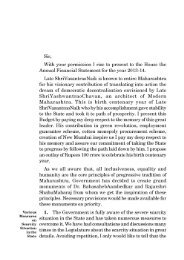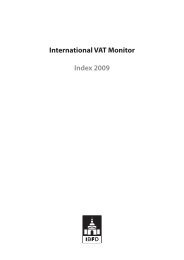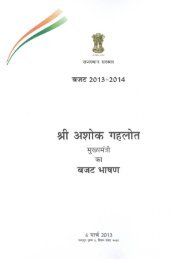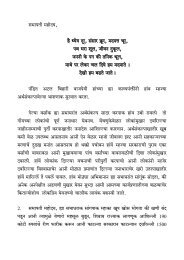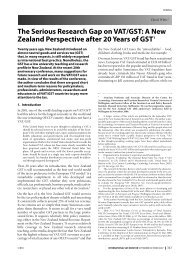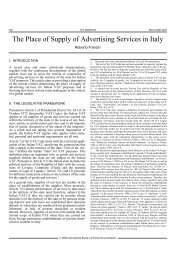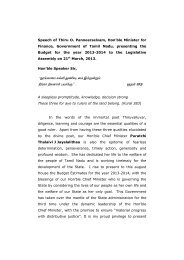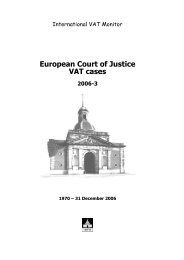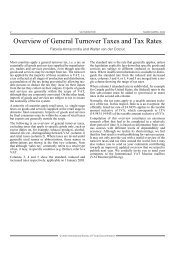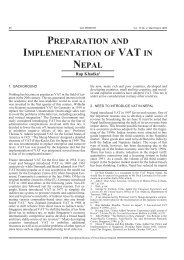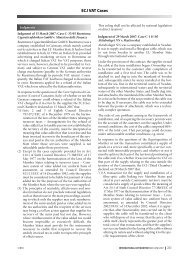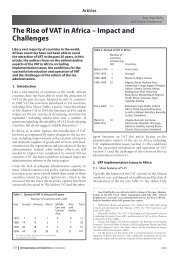The New EU Place-of-Supply Rules from a ... - empcom.gov.in
The New EU Place-of-Supply Rules from a ... - empcom.gov.in
The New EU Place-of-Supply Rules from a ... - empcom.gov.in
Create successful ePaper yourself
Turn your PDF publications into a flip-book with our unique Google optimized e-Paper software.
Articles<br />
lic hospitals, universities, libraries and other public <strong>in</strong>stitutions.<br />
In order to ensure adm<strong>in</strong>istrative simplicity, the<br />
tax authorities should confirm that customers with a<br />
dual VAT status and those that are also perform<strong>in</strong>g nontaxable<br />
supplies, such as public authorities, should be<br />
treated as taxable persons for the purposes <strong>of</strong> the place<strong>of</strong>-supply<br />
rules if they hold a valid VAT identification<br />
number, even if that number was assigned to them solely<br />
for the purpose <strong>of</strong> account<strong>in</strong>g for VAT on their <strong>in</strong>tra-<br />
Community acquisitions <strong>of</strong> goods.<br />
<strong>The</strong> fact that the service provider has received confirmation<br />
<strong>of</strong> the validity <strong>of</strong> his customer’s VAT identification<br />
number through the VIES should be considered to mean<br />
that the service provider has applied the B2B place-<strong>of</strong>supply<br />
rules with sufficient due diligence.<br />
4. <strong>Place</strong>-<strong>of</strong>-<strong>Supply</strong> <strong>Rules</strong><br />
As regards services supplied to taxable persons, the new<br />
place-<strong>of</strong>-supply rules consist <strong>of</strong> a general rule (see 4.1.), a<br />
number <strong>of</strong> specific rules (see 4.2. to 4.4.), and a broad<br />
override rule (see 4. .).<br />
4.1. General rule<br />
Under the new Art. 44, the place <strong>of</strong> supply <strong>of</strong> services to<br />
a taxable person act<strong>in</strong>g as such is the place where that<br />
person has established his bus<strong>in</strong>ess. However, if those<br />
services are provided to a fixed establishment <strong>of</strong> the taxable<br />
person, the place <strong>of</strong> supply <strong>of</strong> those services is the<br />
place where that fixed establishment is located.<br />
Unless specifically provided otherwise, all B2B services<br />
are subject to the new general place-<strong>of</strong>-supply rule,<br />
which, however, does not take precedence over the specific<br />
rules. Consequently, the general rule only applies if<br />
the service is not covered by one <strong>of</strong> the specific rules, 7<br />
which may give rise to difficulties if the service consists<br />
<strong>of</strong> several elements that, considered separately, would be<br />
subject to different place-<strong>of</strong>-supply rules because the<br />
new Art. 44 does not <strong>in</strong>dicate how bundled services must<br />
be treated and how “separate services” must be dist<strong>in</strong>guished<br />
<strong>from</strong> “ancillary services”. 8<br />
Example<br />
A service provider established <strong>in</strong> Member State 1 supplies a bundled<br />
service to a taxable person <strong>in</strong> Member State 2, which consists<br />
<strong>of</strong> the repair and ma<strong>in</strong>tenance <strong>of</strong> an immovable property<br />
located <strong>in</strong> Member State 3, and management and consultancy<br />
services. <strong>The</strong> price for the bundle consists <strong>of</strong> a s<strong>in</strong>gle fee.<br />
If the repair and ma<strong>in</strong>tenance services are considered to be the<br />
pr<strong>in</strong>cipal services, the entire supply is deemed to be supplied <strong>in</strong><br />
Member State 3, i.e. where the immovable property is located.<br />
On the other hand, if the management and consult<strong>in</strong>g services<br />
are considered to be the pr<strong>in</strong>cipal services, the entire supply is<br />
deemed to be supplied <strong>in</strong> Member State 2, i.e. where the recipient<br />
<strong>of</strong> the service has established its bus<strong>in</strong>ess.<br />
Under ECJ case law, there is a s<strong>in</strong>gle supply, particularly,<br />
where one or more elements are to be regarded as constitut<strong>in</strong>g<br />
the pr<strong>in</strong>cipal supply, whilst one or more elements<br />
are to be regarded as ancillary supplies which share the<br />
tax treatment <strong>of</strong> the pr<strong>in</strong>cipal supply. 9 In the case <strong>of</strong> a<br />
complex service, the different elements are so closely<br />
l<strong>in</strong>ked to each other that they can not be split up <strong>in</strong> order<br />
to ensure rational taxation. 10<br />
In l<strong>in</strong>e with the ECJ’s case law, a supply <strong>of</strong> services should<br />
be considered to be the pr<strong>in</strong>cipal supply if it is clear that<br />
all components <strong>of</strong> the service are either so closely l<strong>in</strong>ked<br />
that, <strong>from</strong> an economic perspective, they form a s<strong>in</strong>gle,<br />
<strong>in</strong>divisible supply, whose split-up would be artificial, or<br />
one component is predom<strong>in</strong>ant and other components<br />
are ancillary thereto. Criteria that can be used for identify<strong>in</strong>g<br />
the pr<strong>in</strong>cipal supply are, <strong>in</strong>ter alia, the word<strong>in</strong>g <strong>of</strong><br />
the underly<strong>in</strong>g agreement and the pric<strong>in</strong>g.<br />
<strong>The</strong> new Art. 4 broadens the scope <strong>of</strong> the concept <strong>of</strong><br />
taxable person <strong>in</strong> the framework <strong>of</strong> the place-<strong>of</strong>-supply<br />
rules; however, the use <strong>of</strong> the phrase “taxable person act<strong>in</strong>g<br />
as such” <strong>in</strong> the new Art. 44 gives rise to the question <strong>of</strong><br />
whether the general B2B place-<strong>of</strong>-supply rule only<br />
applies where the customer uses the service for the purposes<br />
<strong>of</strong> his economic activities, and not for his non-economic<br />
activities, if any. 11 If the words “act<strong>in</strong>g as such”<br />
must be <strong>in</strong>terpreted as mean<strong>in</strong>g that the general B2B<br />
place-<strong>of</strong>-supply rule only applies where the customer<br />
uses the service for the purposes <strong>of</strong> his economic activities,<br />
that provision would put a disproportionate burden<br />
on the service provider. This is contrary to the aim <strong>of</strong><br />
Directive 2008/8 <strong>of</strong> contribut<strong>in</strong>g to the realization <strong>of</strong> the<br />
<strong>in</strong>ternal market by tak<strong>in</strong>g away the h<strong>in</strong>drances for bus<strong>in</strong>esses<br />
mak<strong>in</strong>g cross-border supplies 12 . In particular,<br />
even though common sense should be followed, there<br />
would be a number <strong>of</strong> cases where the purpose for which<br />
services are purchased could prima facie be either for a<br />
taxable or a non-taxable purpose, putt<strong>in</strong>g the supplier<br />
<strong>in</strong>to the difficult position <strong>of</strong> hav<strong>in</strong>g to decide whether or<br />
not to take the risk <strong>of</strong> apply<strong>in</strong>g the reverse charge.<br />
7. ECJ judgments <strong>of</strong> 2 September 199 <strong>in</strong> Jürgen Dudda v. F<strong>in</strong>anzamt Bergisch<br />
Gladbach, Case C- 27/94, [199 ] ECR I-4 9 ; and <strong>of</strong> 12 May 200 <strong>in</strong><br />
RAL (Channel Islands) Ltd, RAL Ltd, RAL Services Ltd, RAL Mach<strong>in</strong>es Ltd v.<br />
Commissioners <strong>of</strong> Customs and Excise, Case C-4 2/0 , [200 ] ECR I- 947.<br />
8. ECJ judgments <strong>of</strong> 2 January 2001 <strong>in</strong> Commission <strong>of</strong> the European Communities<br />
v. French Republic, Case C-429/97, [2001] ECR I- 7;<br />
<strong>of</strong> 2 May 199 <strong>in</strong> Faaborg-Gelt<strong>in</strong>g L<strong>in</strong>ien A/S v. F<strong>in</strong>anzamt Flensburg, Case<br />
C-2 1/94, [199 ] ECR I-2 9 ; <strong>of</strong> 2 February 1999 <strong>in</strong> Card Protection Plan<br />
Ltd. v. Commissioners <strong>of</strong> Customs and Excise, Case C- 49/9 , [1999] ECR<br />
I-97 ; and <strong>of</strong> 27 October 200 <strong>in</strong> Levob Verzeker<strong>in</strong>gen BV, OV Bank NV v.<br />
Staatssecretaris van F<strong>in</strong>anciën, Case C-41/04, [200 ] ECR I-94 .<br />
9. See ECJ judgments <strong>in</strong> Faaborg-Gelt<strong>in</strong>g L<strong>in</strong>ien, Card Protection Plan and<br />
Levob, see note 8.<br />
10. See Commission v. France (note 8).<br />
11. In its judgment <strong>of</strong> November 2008 <strong>in</strong> Kollektivavtalsstiftelsen TRR<br />
Trygghetsrådet v. Skatteverket, Case C-291/07, which has not yet <strong>of</strong>ficially been<br />
published, the ECJ declared that Art. 9(2)(e) <strong>of</strong> the former Sixth Directive and<br />
Art. (1)(c) <strong>of</strong> Directive 200 /112 must be <strong>in</strong>terpreted as mean<strong>in</strong>g that,<br />
where the customer for consultancy services supplied by a taxable person<br />
established <strong>in</strong> another Member State carries out both an economic activity<br />
and an activity which falls outside the scope <strong>of</strong> those Directives, that customer<br />
is to be regarded as a taxable person, even where the supply is used solely for<br />
the purposes <strong>of</strong> the latter activity. <strong>The</strong> ECJ’s decision <strong>in</strong> that case was, however,<br />
based on the fact that the phrase “act<strong>in</strong>g as such” was not <strong>in</strong>cluded <strong>in</strong> the place<strong>of</strong>-supply<br />
rules. By contrast, that phrase is <strong>in</strong>cluded <strong>in</strong> the new Art. 44 which<br />
raises the issue <strong>of</strong> how to <strong>in</strong>terpret it.<br />
12. Recitals (1) and (2) <strong>of</strong> the preamble to Directive 2008/8.<br />
102 INTERNATIONAL VAT MONITOR MARCH/APRIL 2009 © IBFD



